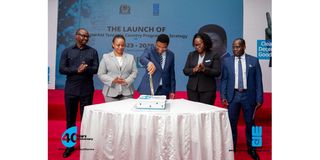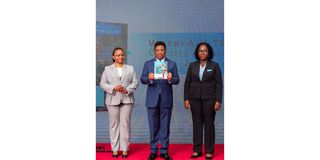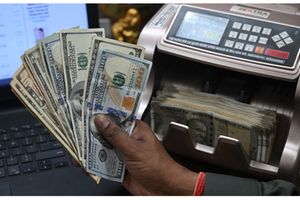40 years of WASH services and WaterAid Tanzania renewed commitments

Prime Minister of Tanzania, Kassim Majaliwa cuts WaterAid Tanzania 40 years anniversary cake. Looking on are Hon. MaryPrisca Mahundi, Deputy Minister for Water (second left), Ms Anna Tenga Mzinga, WaterAid Tanzania (second right), Shaibu Kaduara, Zanzibar Minister for Water, Energy and Minerals (right) and Government Official (left).
It is 40 years of hard work and dedication for WaterAid and it speaks more of relentless pledges to redress WASH (Water, Sanitation and Hygiene) services from the centralised to decentralised levels to achieve a shared vision of having clean water, decent toilets and good hygiene for everyone, everywhere.
The narrative is that over half of all Tanzanian healthcare facilities (HCFs) lack piped water supply and only 30 percent have access to sanitation. Water access is standing at 88 and 77 percent in urban and rural areas respectively. Tanzania is a country of 62 million people, mostly living in rural areas.
Access to water is compromised due to the low functionality of water points, with 34 percent of these being non-operational. Access to the improved toilets at the household level sits at 66 percent. For girls, access to WASH facilities is a critical factor affecting school attendance, especially during menstruation and is one of the key reasons for girls to drop out. 34 percent of girls reported missing school during menstruation due to a lack of changing rooms and 26 percent blamed the lack of a clean and suitable toilet.
Since 1983, the entity has been the reliable WASH services powerhouse contributing to improved access to water, sanitation and hygiene (WASH) services across the country, working closely with the Government, Civil Society Organizations (CSOs) and other international NGOs.
Building on basic roles of delivering WASH services to the country was a significant endeavor by the entity until 2016, but going forward, a shift of focus was evidenced with much emphasis placed on institutional capacity building, influencing as a knowledge broker and as a catalyst bringing together different sectors and partnerships to achieve access to WASH.

Everline Okello, a nurse, washing her hands in an improved handwashing facility in Geita Region.
Improved access to WASH services, which is a long-standing ambition of WaterAid in the country aligns with the national motives to attain sustainable, inclusive WASH Services in targeted geographic areas for wider change and safe and prioritize WASH across the health sector to improve public health, contributing to the United Nations (UN) Sustainable Development Goals – particularly SDG Goal number 6 (Clean water and sanitation).
Achievements
40 years of jubilation of WaterAid culminated with improved access to affordable wastewater management systems for unplanned urban locations, improved access to safe water through technology innovation and efficient management systems and proper WASH services and systems in Healthcare facilities to facilitate better health services with dignity. As if there’s no tomorrow, WaterAid also supported enhanced access to transparent management of water supply schemes, providing water 24/7 water services.
“I would like the whole world to know that our facility is now in good condition because of the water infrastructure. We invite everyone to learn about the quality of our facility. But even for us, the water availability now keeps us safe because we are immune to diseases and even protect the community. It is our pleasure to provide services to the community. Imagine a situation where the service provider is sick due to lack of water, who will serve the patients? – Everline Okello, a nurse, poses a constructive question.
Its close attachment with the local communities helped it to facilitate proper WASH service in school settings and later establish WASH clubs in those target schools, cushioning water, sanitation and hygiene woes facing most schools in the country. “We used to go to fetch water like two kilometers from here so the time that we were supposed to be in the class we wasted searching for water. Now that this water project is here, we have been safe and fetching water here in school without any problem,” a schoolgirl narrates the water access relief she is having now unlike in the past.
WaterAid’s expansive footprints saw successful hand hygiene campaigns reaching the mass with the strong hygienic messages, followed by the supply of mass handwashing facilities in public spaces to improve hand hygiene along with supporting the National Mass hand-washing guideline.
Crossing its horizon to enable money-making WASH ventures, the organization supported development and marketing WASH Business products in collaboration with Microfinance institutions and entrepreneurs.
“My job as a frogman was very risky. The worst was during the rainy season as it is when demand is the highest, but the conditions for pit emptying are very dangerous. I remember incidents like the collapsing of the diversion pits while my friends were in and friends slipping and falling into a latrine pit. I have now been working with UMAWA and we work in safe and hygienic conditions, and I get a regular salary. I thank God for this project,” a frogman reminisces of the precarious working conditions he faced prior to the improved ones.
In the long run of its exalted services, 8 million people were reached with clean water, sanitation and hygiene services. Like most women, I spent a lot of time looking for water, but now, as a baker I am very confident with the water I use in my baking business,” says one of the rural dwellers who enjoys tap water from the close proximity.

Prime Minister Kassim Majaliwa officially launches the 2023-2028 WaterAid Tanzania Strategy. Others are Hon. MaryPrisca Mahundi , Deputy Minister of water (left) and Ms Anna Tenga Mzinga, Country Director WaterAid Tanzania (right)
Country Programme 2023-2028 Strategy
Going forward with this new five-year strategy, WaterAid envisions picking from the past commitment to halt WASH challenges for everyone and everywhere blending with these fresh drives that focus on sustainable, inclusive and safe WASH services in targeted areas and prioritize WASH across the health sector to improve public health. If the strategy delivers, it will also be a big boost to the WASH services in Tanzania, which are short of financing from the ministerial budget allocations and donor funding.
WaterAid now takes on the roles of strengthening WASH systems as learned from the past initiatives that doing so would cater for the coveted sustainability in greater scales. It has also seen the imperatives of including sidelined groups, particularly women and children who face most of the ordeals of WASH challenges, into the functions allowing new voices to be heard across the decision-making levels.
Despite the above-named tasks, it is also rested with embarking into innovation and technologies to ensure sustainable WASH services and behaviors. With this in mind, we will be able to have the required level of water quality and safety considering that innovations and technologies are properly applied.
The strategy can’t prosper without a shared intervention from multilateral donors, Government, service providers, civil society organizations (CSOs) the private sector, individuals, funding entities to end WASH crisis. WAT commits to pushing boundaries and positioning WASH as the catalyst for achieving sustainable development in Tanzania in the foreseeable future.
Country Programme 2023-2028 Strategy launch and 40 years anniversary
Commemoration of 40 years anniversary coincided with the official launch of the WaterAid’s Country Programme Strategy (2023-2028) graced by Tanzania Prime Minister, Kassim Majaliwa who prior to officiating the event, had a pleasure to visit some projects models booth, including but not limited to, a water treatment plant and liquid wastewater management modeling for faecal sludge management.
The country’s Premier, during his speech, referring to the World Bank’s 2023 Report (on Tanzania Economic Update Report 2023) stated that Tanzania loses Sh5.6 trillion annually due to poor access to clean water and sanitation, a new high equivalent to 3.2 percent of the GDP.
He said that the Government tracks the implementation of the National Water, Sanitation, and Personal Hygiene Guidelines in healthcare facilities. Ensure that all healthcare facilities in the country are connected to clean and safe water systems, have good toilets, equipped with hand- washing facilities, and burn chambers.
“I would like to let you know that the Prime Minister's Office is committed to coordinating and managing the One Health initiative at the National, Sub-national, District, wards, and village levels, with one of the priorities being to address Antimicrobial Resistance (AMR). On that basis, my office will collaborate with the Ministry of Health to determine how to incorporate water, sanitation and hygiene in implementing the One Health Plan to achieve better results,” said Mr Majaliwa.
He required the Ministry of Water to form synergies with stakeholders to develop and implement the Public-Private Partnership (PPP) guidelines to strengthen investment in the sector.
“I thank all development stakeholders for recognizing the importance of working together with the government to implement various projects in the country, and I assure them that the government will continue to collaborate with them while adhering to all agreements, guidelines, and procedures to ensure that more projects in both urban and rural areas are implemented in Tanzanians' most beneficial interests,” Prime Minister commended and concluded.
WaterAid Country Director, Anna Mzinga thanked the Prime Minister for his presence at their memorable event furnishing it with his strong commitments aimed at transforming the WASH sector in the country. She said that WaterAid has made significant strides in the Water, Sanitation and Hygiene Sectors.
“Looking back, all this would not be possible without the people who held positions before me, I would like to thank them all for laying a solid foundation that has allowed WaterAid to maintain the position it does now,” she hinted.
As for the strategy, while implementing it, she pledged to integrate gender aspects and women’s rights into their interventions, putting women at the heart of the initiative, in cooperation with the Government.
This means that improved WASH services will increase the time available to women for economic activities and for participating in leadership and decision-making.
With the support of donors and partners, Ms Anna believes that their five years strategy will get much better having been impressed with last year’s plan that helped 8 million children, babies, girls and women, boys and men have access to clean water, sanitation and hygiene. She is also grateful to have them on her side.
The Director also thanked her top management, Chief Executive Officer Tim Wainwright, East Africa Regional Director, Olutayo Bankole Bolawole, the IPD support team and all the East Africa regional team for their bold leadership and guidance to WaterAid Tanzania Country Programme.
The event was concluded by a panel discussion that dissected the delivery practice, a step that will address biological and practical WASH demands for women and girls.
Speakers at that concluding panel were Neema Lugangira (MP) – Member of Parliament and a WASH Champion, Anyitike Mwakitalima from the Ministry of Health, Jane Mselle Sembuche from WaterAid Uganda and Johannes Msuya – Equity Bank.



